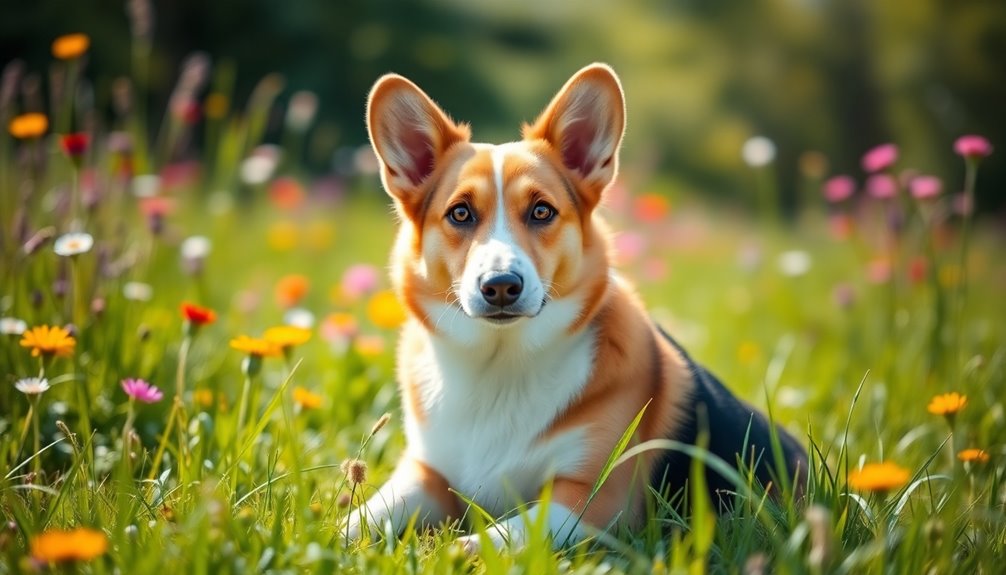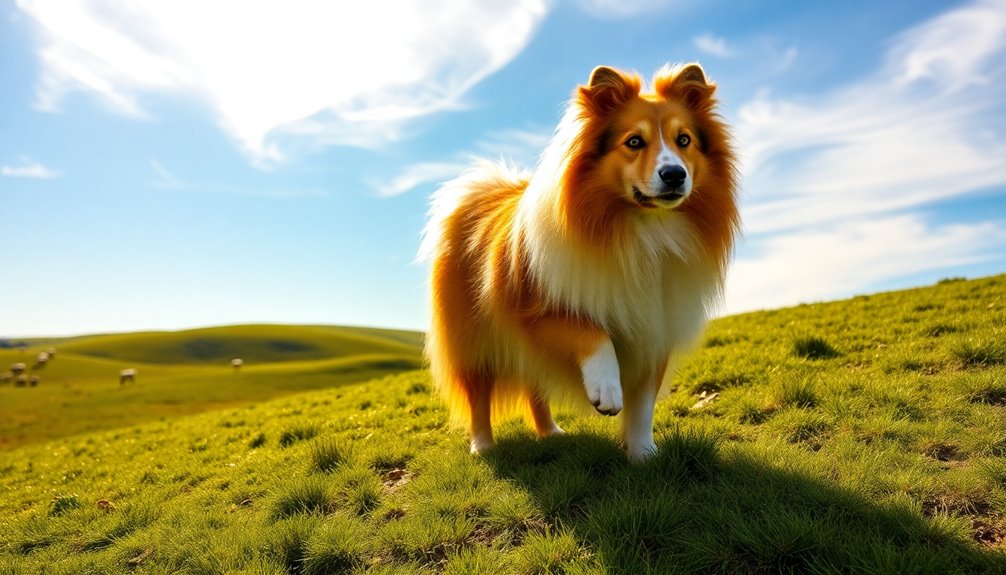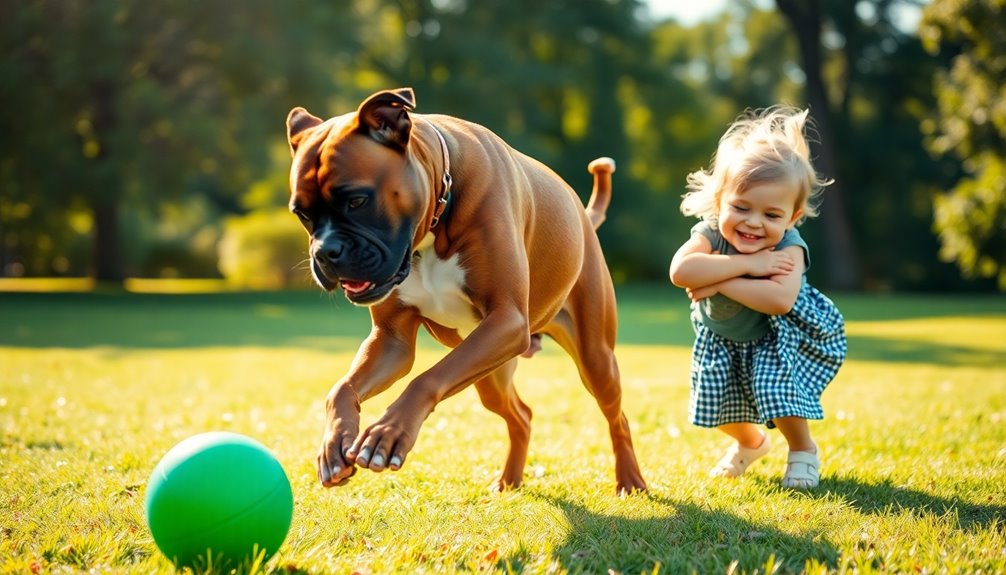The Cardigan Welsh Corgi is a loyal companion with a big heart, perfect for families and individuals alike. Standing between 10 to 13 inches tall, they possess a sturdy build and a delightful personality. Known for their intelligence and trainability, these affectionate dogs thrive on social interaction and exercise, requiring 30 to 45 minutes of activity daily. With a lifespan of about 13.1 years, they offer long-lasting companionship. Regular grooming and health check-ups are vital to keep them happy and healthy. If you're curious about their unique traits and history, you'll find even more intriguing facts ahead.
Key Takeaways
- Cardigan Welsh Corgis are affectionate and loyal, forming strong bonds with their families and making them ideal companions.
- Their playful yet protective nature ensures they are great with children and adaptable to various living environments.
- With a history as herders, they are intelligent and trainable, thriving on social interaction and mental stimulation.
- Regular exercise and grooming are essential to maintain their health and energy, contributing to their longevity of 10 to 15 years.
- Early socialization and training using positive reinforcement techniques foster positive behavior and a well-adjusted personality.
Introduction
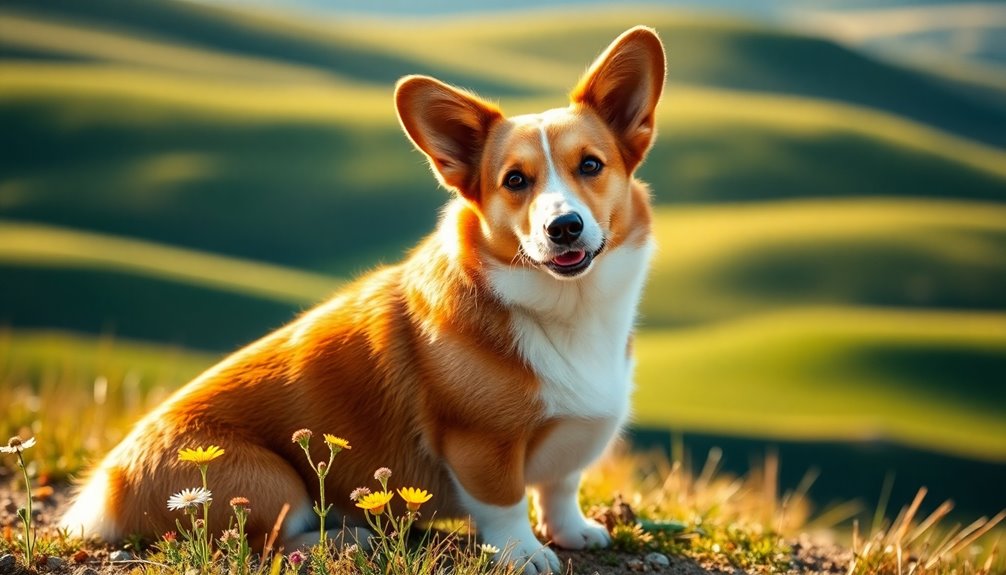
The Cardigan Welsh Corgi stands out as a loyal companion, known for its playful spirit and affectionate nature. These dogs typically stand between 10 to 13 inches tall and weigh around 30 to 38 pounds for males, while females range from 25 to 34 pounds. Their medium-length coat comes in various colors like red, sable, brindle, blue merle, and black, often adorned with tan points and white flashings. You'll notice their long tail and larger, rounded ears, which differ from their Pembroke counterparts.
Intelligent and trainable, Cardigans thrive on daily exercise, requiring 20 to 40 minutes to keep their moderately high energy in check. They can be reserved with strangers but become fun-loving once they warm up. Given their average weight range, they can be well-suited for families living in both apartments and houses, provided they receive the necessary exercise.
Generally good with children, they may need training to manage their herding instincts, ensuring they don't accidentally herd your kids.
With an average lifespan of 10 to 12 years, Cardigans are healthy but must be monitored for specific genetic issues. They possess strong herding instincts and excel in various competitions, making them not only adorable companions but also engaging partners in activities.
History and Origin
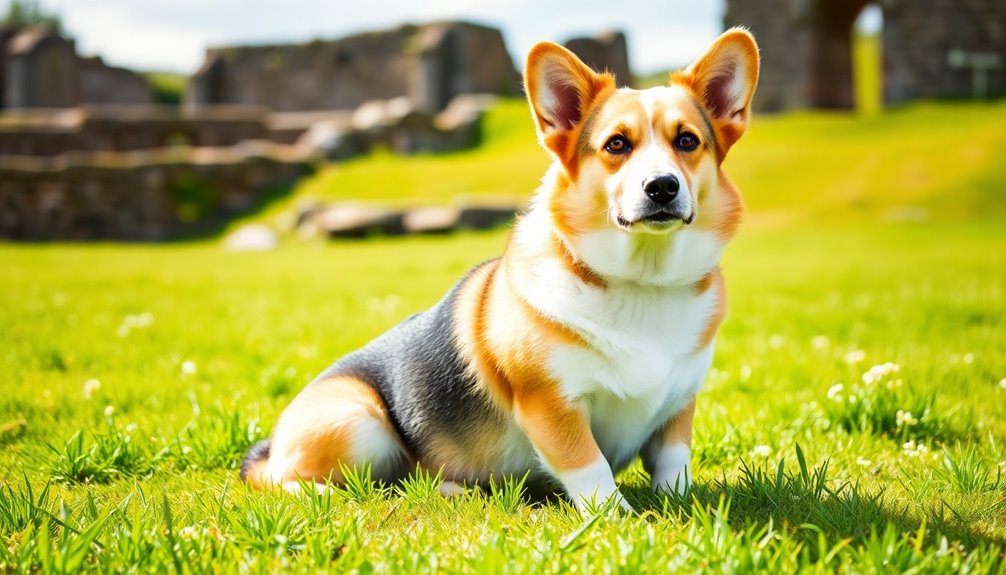
The Cardigan Welsh Corgi traces its roots back to around 1200 BC when the Celts brought dogs to Wales, likely from the teckel family.
These dogs didn't just serve as companions; they were essential for herding cattle and guarding farms.
As you explore their history, you'll see how their hardworking nature shaped the breed's development and purpose in Welsh society. This dedication to herding was recognized as early as 920 AD when ancient Welsh laws acknowledged the breed's value for cattle and sheep.
Where and when the breed originated
Originating in Wales around 1200 BC, the Cardigan Welsh Corgi has a rich history tied to the Celtic tribes that migrated from Central Europe.
You'll find that this breed hails from Cardiganshire, a rugged, rocky region in southwest Wales, making it one of the oldest breeds in the British Isles. For over 3,000 years, the Corgi has thrived in Wales, evolving from an early transitional type between the Teckel and Spitz families.
As you explore its lineage, you'll discover it's descended from the Teckel family, which includes the Dachshund. The breed maintained its distinctiveness despite interbreeding with Pembroke Welsh Corgis and influences from other dog types, such as those introduced during the Viking invasion.
By the late 19th and early 20th centuries, the Cardigan Welsh Corgi was recognized as a distinct breed.
In the early 20th century, the breed gained formal recognition. It first appeared under the Kennel Club in 1925, although it was initially registered alongside Pembrokes. Additionally, the Cardigan Welsh Corgi is known for its excellent watchdog capabilities, further contributing to its popularity as a companion dog.
In 1934, the breeds were separated, paving the way for the Corgi's growth and popularity, especially in the United States.
Cattle Herding and Guarding
As the Cardigan Welsh Corgi evolved, its role on the farm became clear—these dogs weren't just companions; they were invaluable assets in cattle herding and guarding.
With their agility and quickness, they nipped at cattle heels, guiding herds efficiently. Their short stature protected them from aggressive kicks, allowing them to navigate safely among the cattle. You'd find them working behind the herd, clearing the way by chasing off predators and other trespassing animals.
These dogs also served as drovers, expertly driving cattle from Welsh farms to English markets. They utilized their strong herding instincts, responding to verbal and visual cues like whistles and voice commands. Through controlled exposure to livestock, they built the confidence needed to excel in their roles. The breed's history as a predator deterrent further underscores their importance on the farm.
Their loyalty extended beyond herding, as they acted as family guardians, hunting vermin and protecting cattle from threats.
Bred with large, round feet for traversing marshy valleys, their physical adaptations made them versatile workers.
Today, the Cardigan Welsh Corgi retains these strong herding instincts, a testament to their hardworking nature and deep-rooted history on the farm.
Physical Characteristics
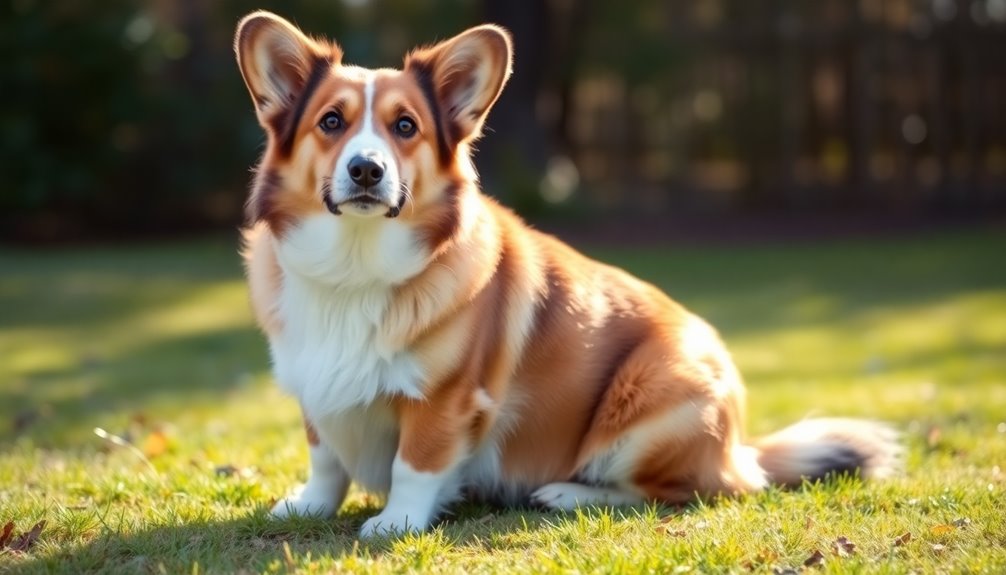
When you look at a Cardigan Welsh Corgi, you'll notice their sturdy build and compact size, which gives them impressive agility. Weighing between 25 to 38 pounds and standing 10 to 12.5 inches tall, they've a long, low-slung body with short, stubby legs. Their medium-length double coat can come in a variety of colors, often highlighted by a distinctive white bib. The male Cardigan Welsh Corgi typically weighs 30-38 lbs when fully grown.
Size, weight, and coat details
The Cardigan Welsh Corgi stands out with its distinctive physical characteristics, making it a unique breed among companion dogs. This breed typically weighs between 30-38 pounds for males and 25-34 pounds for females. Both genders stand at a height of 10.5 to 12.5 inches at the shoulder.
You'll find that most growth happens in the first six months, with full height reached by 12 months and full weight by 18 months to 2 years. Genetics play a significant role in determining their adult size and weight.
When it comes to their coat, Cardigans have a medium-length, weather-proof covering that features a hard outer layer and a soft undercoat. The preferred coat is straight, and you'll only want to tidy the feet and whiskers if necessary.
The coat is shorter on the head, ears, and legs, while it's longer on the neck, chest, and tail. You can expect a variety of colors, including red, sable, brindle, and blue merle, often with white markings.
Short, Stubby Legs
One of the most striking features of the Cardigan Welsh Corgi is its short, stubby legs, which play a crucial role in its functionality and unique charm. These legs allow the Corgi to nip at the heels of cattle and swiftly dodge potential kicks, making them adept herders. This distinctive trait stems from a genetic mutation that results in their short stature, and it's an asset for avoiding strikes from larger livestock.
Despite their length, these sturdy legs provide endurance essential for long days of work. The slight bow in the forearm, as specified by breed standards, adds to their agility while maintaining a powerful appearance. However, the short legs and long bodies can lead to health concerns like intervertebral disc disease (IVDD), which affects their vertebrae and spinal cord. Increased injury risk due to modern breeding practices is another factor to consider when caring for your Corgi. You need to be cautious with your Corgi, as simple activities like jumping or using stairs can pose risks due to their shape.
Regular check-ups and early detection of potential injuries are crucial for their well-being. Overall, their short, stubby legs are a perfect blend of charm and functionality, making the Cardigan Welsh Corgi a remarkable companion.
Temperament and Personality
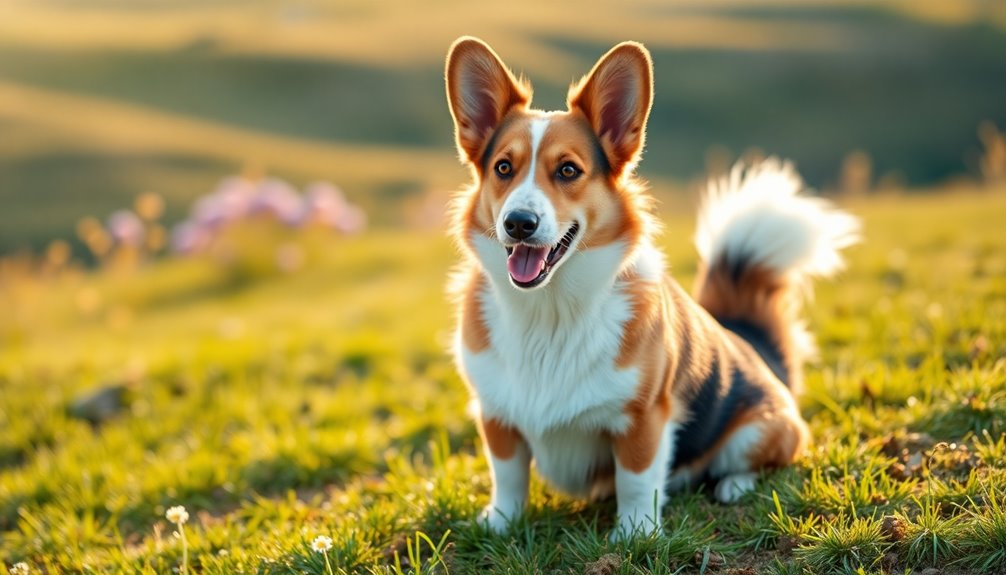
When you think about the Cardigan Welsh Corgi, you'll find a playful yet protective companion that fits well into various family dynamics. Their affectionate nature makes them suitable for families, individuals, or even other pets, ensuring everyone feels loved and secure. With their keen instincts and loyalty, these dogs not only bring joy but also a sense of safety to your home. Cardigans are known for their even-tempered personalities, which further enhances their role as devoted family companions.
Playful yet Protective Nature
Embodying a delightful mix of playfulness and protectiveness, the Cardigan Welsh Corgi makes an ideal companion for families. With their cheerful personalities, these dogs thrive on interactive play and engage wholeheartedly in games with you. Their love for fun never fades, and while they're not hyperactive, they enjoy participating in canine sports like agility and obedience trials. Their adaptability to various living environments, including apartments and urban settings, makes them suitable for diverse families. Additionally, their need for mental stimulation can be fulfilled with puzzle toys and training sessions that keep their curious minds engaged.
At the same time, their protective instincts shine through. Cardigans are alert and intelligent watchdogs, always ready to notify you of potential dangers or unusual activity. They might initially be reserved around strangers, but once they sense no threat, they warm up quickly.
Their herding background contributes to their watchful nature, ensuring your loved ones feel safe.
With an even-tempered disposition, these dogs form deep bonds with their families, showing unwavering loyalty and affection. While they can be a bit stubborn, their eagerness to learn and respond to positive reinforcement makes training a rewarding experience.
Suitability for families, individuals, or other pets
Cardigan Welsh Corgis are a fantastic choice for families, individuals, and multi-pet households alike. Their loyal and affectionate nature makes them wonderful companions, especially for families with children. You'll find that they bond closely with family members, often following you around the house.
Their adaptability allows them to thrive in various living situations, whether you're in an apartment or a larger home, as long as they receive enough exercise and mental stimulation. Cardigan Welsh Corgis have a life expectancy of 12-15 years, which means you can enjoy many years of companionship together. Regular outings to great places for puppy socialization can further enhance their adaptability and confidence.
For individuals, their intelligent and trainable demeanor makes them ideal, even for first-time dog owners. Just remember, they need social interaction to prevent boredom, so they aren't great for those who leave them alone for long periods.
If you have other pets, Corgis generally get along well, especially if socialized early. Their playful nature means they'll enjoy engaging with fellow pets, but keep an eye on their herding instincts.
With proper supervision and training, they can coexist harmoniously with cats and even farm animals. Overall, whether you're a family, an individual, or a multi-pet household, a Cardigan Welsh Corgi can fit seamlessly into your life.
Health and Lifespan
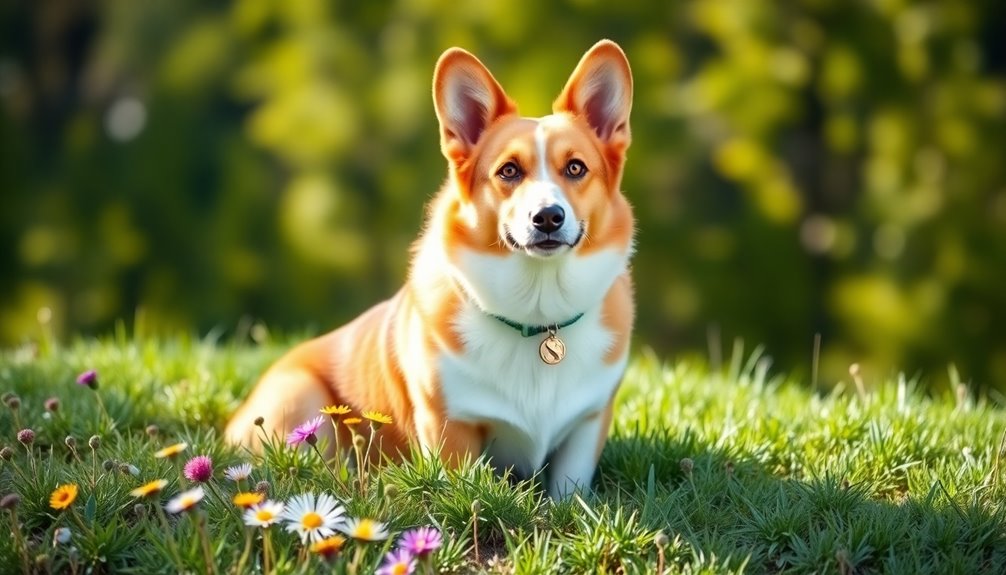
When you bring a Cardigan Welsh Corgi into your home, it's important to know they typically live between 12 to 15 years. Like any breed, they can face common health concerns, such as spinal disk disease and dental issues, so staying vigilant is key. Regular veterinary check-ups and preventive care are essential for addressing genetic health risks.
Typical lifespan of the breed
The typical lifespan of a Cardigan Welsh Corgi ranges from 12 to 15 years, with many living up to 15 years when given proper care. A recent 2024 UK study found an average life expectancy of 13.1 years, which is quite similar to their Pembroke Welsh Corgi cousins. Several factors influence this lifespan, including genetics, diet, exercise, and preventive health care. It's important to note that regular veterinary check-ups are essential for early detection of health issues.
You'll want to ensure your Corgi receives a balanced diet to promote a long and healthy life. Regular exercise and mental stimulation are essential to keep them fit and engaged.
Don't overlook routine veterinary check-ups; they're vital for early detection of potential health issues. Additionally, maintaining good dental hygiene is crucial in preventing dental disease, which can impact overall health.
With responsible breeding practices and attention to care, you can significantly extend your Corgi's lifespan. While common causes of death include cancer and old age, monitoring your dog's health closely can help you address issues before they become serious.
Common health concerns or genetic predispositions
Throughout their lives, Cardigan Welsh Corgis may face several health concerns and genetic predispositions that can impact their well-being. One major issue is joint problems, including hip dysplasia, which can lead to pain and arthritis.
Due to their unique body structure, Corgis are also at risk for intervertebral disc disease (IVDD), causing significant back pain and mobility issues. You might notice your Corgi struggling with stairs or small jumps, which could indicate underlying back problems.
Moreover, they can be prone to progressive retinal atrophy (PRA), a genetic eye disorder that can result in blindness, and degenerative myelopathy, a progressive neurological disease. Additionally, their average lifespan of 12 to 15 years may be affected by genetic predispositions that lead to various health issues.
Weight management is crucial too, as excess weight can exacerbate joint and back problems. It's also important to monitor dental health, as many Corgis experience dental disease by age two. Regular brushing and professional cleanings can help prevent serious oral issues.
Lastly, be aware that the breed has low genetic diversity, which can lead to a higher risk of inherited health problems. Staying informed on these concerns can help you ensure your Corgi lives a healthy, happy life.
Tips for maintaining health and wellness
Considering the potential health issues Cardigan Welsh Corgis may face, maintaining their overall health and wellness becomes a priority for every owner.
Start by providing a high-quality dog food formulated for medium-sized, energetic dogs. Make sure it's low in fat to prevent weight gain, and focus on protein from quality meat sources. Incorporate essential fatty acids and small amounts of carbohydrates from vegetables or berries for added fiber and antioxidants. Additionally, selecting educational toys can help keep your Corgi mentally stimulated and engaged during indoor playtime.
Regular grooming is also vital. Brush your Corgi to manage shedding and prevent matting, keeping their coat healthy. Attend to skin, ear, and eye care to catch any issues early on. Additionally, regular check-ups with a veterinarian are essential for early detection of health problems.
Daily exercise is crucial. Take your Corgi for walks and consider engaging in activities like herding or agility competitions. This not only keeps them fit but also mentally stimulated.
Don't overlook routine vet check-ups for early detection of health concerns. Keep an eye on their behavior for any signs of discomfort.
Lastly, prioritize dental hygiene with regular teeth cleaning and provide antler chews to help maintain their dental health.
Care Requirements
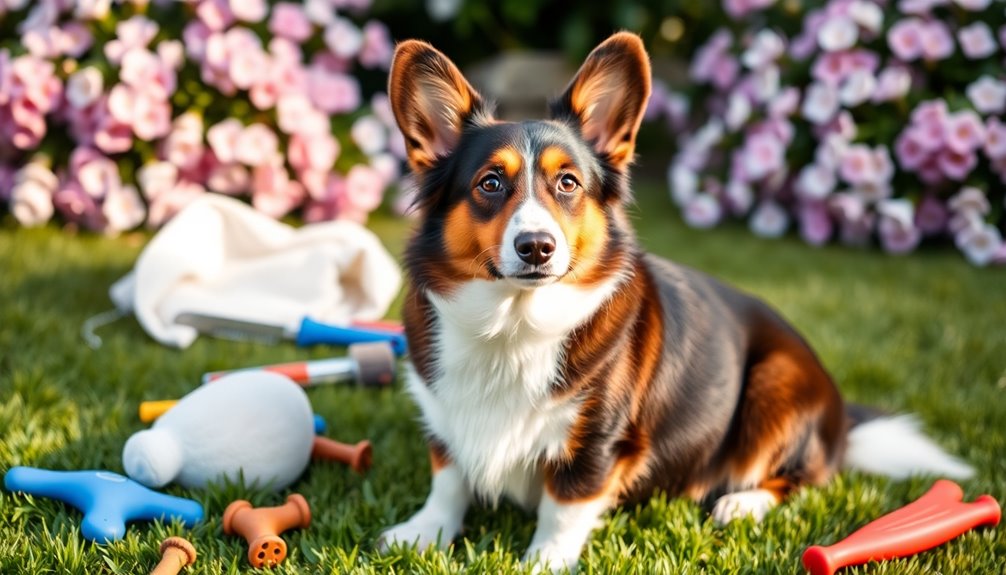
When caring for your Cardigan Welsh Corgi, you'll need to pay attention to grooming, exercise, and diet.
Regular brushing during shedding seasons is crucial to keep their double coat healthy, while daily exercise of 30 to 45 minutes helps maintain their energy levels. Additionally, a balanced diet tailored to their needs will support their overall wellness and prevent weight gain. It's important to remember that individual exercise needs vary based on age, health, and energy levels.
Brushing Frequency During Shedding
Many owners find that brushing their Cardigan Welsh Corgi at least 2-3 times a week is essential for managing shedding and maintaining a healthy coat. During shedding seasons, however, daily brushing becomes even more crucial. This helps remove the dead undercoat and prevents matting, keeping your furry friend comfortable.
For effective grooming, use a slicker brush for the topcoat and an undercoat rake for the dense undercoat. These tools work together to manage loose hair and prevent it from spreading throughout your home. You might also consider a bristle brush or a pin-style brush for general grooming, ensuring your Corgi looks its best. Corgis shed year-round due to their double coats, with increased shedding during peak seasons.
Shedding seasons are most prominent in the summer and winter, when your Corgi will "blow their coat," shedding thick fur to adapt to temperature changes. Spring and fall see increased shedding as well, so stay prepared.
To make brushing easier, try using a Simple Shed Shampoo with oat proteins to loosen the undercoat. Follow up with a Simple Shed Treatment, and use the undercoat rake while the treatment is still in place for optimal results.
Regular brushing keeps your Corgi's coat shiny and healthy!
Exercise requirements and energy levels
Maintaining a healthy lifestyle for your Cardigan Welsh Corgi goes beyond regular brushing; exercise plays a vital role in their overall well-being. Aim for at least 30 to 45 minutes of exercise daily, mixing both physical activities and mental stimulation. Regular activity helps maintain the dog's overall health and prevents long-term health issues.
For puppies, shorter and more frequent bursts of exercise are ideal, while older Corgis might need gentler walks or less intense sessions. Walking is a straightforward and effective way to keep your Corgi active. Short runs or jogs can help burn off excess energy, and playing fetch or engaging in interactive games also provides excellent physical activity.
It's crucial to avoid strenuous exercises that involve excessive jumping to protect their joints.
Feeding tips and diet recommendations
To ensure your Cardigan Welsh Corgi thrives, focusing on a balanced diet is essential. Prioritize high-quality protein sources like beef, chicken, turkey, lamb, and fish, as these are crucial for their health. Incorporate essential fatty acids and omegas, which support optimal well-being. Small amounts of carbohydrates from vegetables, herbs, and berries can also be beneficial. A raw diet can significantly enhance skin and coat condition, leading to a more vibrant and healthy appearance.
Aim for a diet that includes meat, bones, offal, and minimal plant ingredients. Avoid kibble, as its high carbohydrate content may strain your dog's digestive system. Instead, include nutrient-rich options like turkey liver, flaxseed, and salmon oil, while steering clear of foods with additives, preservatives, and fillers.
When determining feeding amounts, consider your Corgi's age, weight, and activity level. For those weighing between 11KG and 17KG, feed about 220g to 340g daily. Puppies will need adjusted portions based on their growth.
Regularly monitor their weight to avoid obesity, and consult a veterinarian for tailored advice. Lastly, avoid leftovers and treats that can lead to metabolic issues, ensuring your furry friend remains healthy and happy.
Training and Socialization
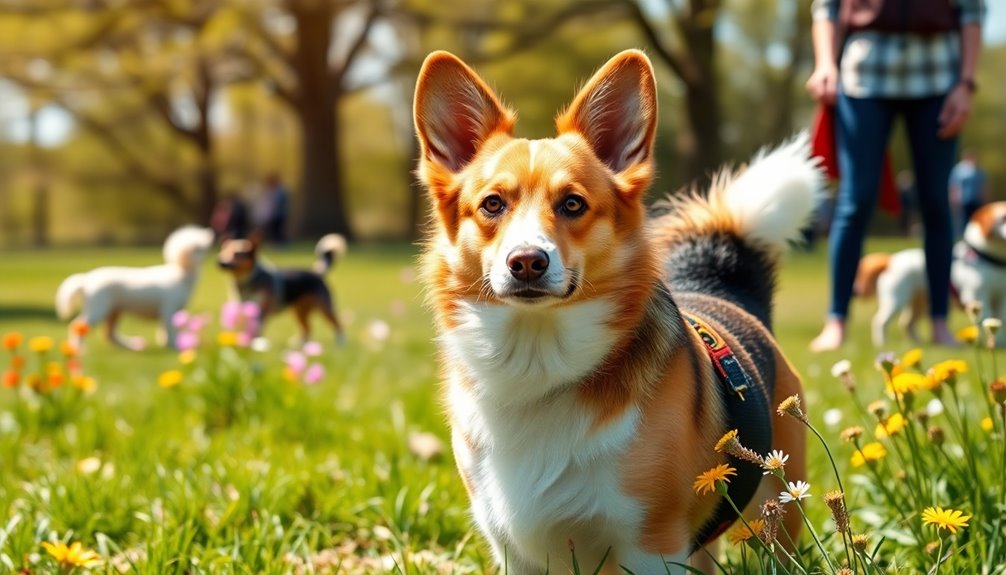
Training your Cardigan Welsh Corgi can be a rewarding experience, as they're eager learners who respond well to guidance. It's essential to introduce them gradually to new friends, helping them feel comfortable and confident in social situations. Keep an eye on their leash reactivity towards strangers, as consistent training can help manage this behavior effectively. Their protective nature makes them suitable watchdogs, so training should also focus on ensuring they differentiate between real threats and everyday occurrences.
Moderately Intelligent, Eager Learner
Cardigan Welsh Corgis shine as moderately intelligent and eager learners, making them a joy to train. Their intelligence allows them to grasp commands quickly, though they may not rank as high as their Pembroke cousins. Early training is essential; you'll find they respond well to various methods, which keeps them engaged and prevents boredom.
Since these dogs are eager to please, positive reinforcement—like praise, treats, and playtime—works wonders. Consistent training with clear boundaries helps build a strong bond between you and your Corgi.
Start with basic commands like "sit," "stay," and "come," using treats and verbal cues effectively. A quiet, distraction-free area is ideal for training sessions.
Keep in mind that Corgis can be a bit stubborn due to their herding background. Patience is key, and if they show resistance, try changing your approach. Avoid distractions to keep their focus, and remember that rewards are your best allies in motivation.
Gradual Introductions to New Friends
Regularly introducing your Cardigan Welsh Corgi to new friends is crucial for their social development. Start socialization between 8 to 14 weeks of age with short, positive experiences. Gradually increase exposure by taking your puppy to busy areas like parks or street corners, helping them adapt to traffic, bicycles, and crowds. Reward positive interactions with treats, praise, or toys, ensuring that their initial experiences are gentle and not overwhelming. Understanding the importance of self-regulation can help your puppy learn to manage their emotions during these interactions.
Expose your pup to diverse environments—parks, urban settings, and quiet countryside. Let them explore different surfaces, such as grass, gravel, and tiles, and familiarize them with household items like vacuum cleaners and brooms. Short car rides can also help them get used to travel, as car rides are beneficial for acclimating them to future vet visits.
Encourage interactions with people of various ages and sizes, including those in hats or uniforms. Organize playdates with other vaccinated dogs to teach doggy etiquette. Monitor your puppy's body language; if they seem scared or overwhelmed, gently remove them from the situation.
Consider enrolling in puppy socialization classes to ensure structured interactions and deepen your bond through obedience training.
Leash Reactivity Towards Strangers
Understanding how to manage leash reactivity is key for a well-rounded socialization experience. For your Cardigan Welsh Corgi, reactivity towards strangers can stem from their herding instincts and natural wariness of the unfamiliar. You might notice barking or lunging when they encounter new people, especially in chaotic environments like your neighborhood. Additionally, implementing intelligent tutoring systems can enhance the training process by providing tailored learning experiences.
Identifying triggers, such as strangers, bicycles, or environmental noise, is essential to address this behavior. Early leash training can significantly help reduce the likelihood of these reactions by teaching your Corgi to associate the presence of strangers with positive experiences.
Training and positive reinforcement are crucial. Use treats and praise to reward calm behavior during walks. Implement controlled socialization by gradually exposing your dog to various stimuli in a safe setting.
Consistency is vital, so practice basic commands like "heel," "sit," and "stay" to reinforce good leash manners.
In real-life scenarios, if your dog starts to react, stop walking and wait for them to relax. Distract them with commands or treats when encountering a trigger.
Keeping your Corgi mentally stimulated through activities like agility training can also reduce reactivity. If you struggle with severe leash reactivity, consider seeking guidance from a professional trainer to help you navigate these challenges effectively.
Ideal Living Environment

When considering an ideal living environment for your Cardigan Welsh Corgi, a house with secure fencing is essential to keep them safe while they explore. They prefer moderate outdoor temperatures, so you'll want to provide a comfortable space for them to enjoy the fresh air without overheating or getting too cold. Additionally, medium-sized dogs like the Cardigan Welsh Corgi can adapt well to apartment living if their energy levels are managed appropriately.
House With Secure Fencing
Creating a safe haven for your Cardigan Welsh Corgi starts with secure fencing, which not only protects your pet but also provides peace of mind. For small breeds like Corgis, a 4-foot fence is often sufficient, but if your Corgi is particularly agile or has a high prey drive, consider a 5-foot fence to prevent jumping.
Ensure the fence is well-embedded into the ground to stop any digging attempts.
Material matters, too. Vinyl panel fencing is durable and low-maintenance, while wrought-iron offers style but needs regular upkeep. Chain link is budget-friendly but may require extra measures to prevent escape. You might also opt for block or stone fences for strength, though they can be pricier. Additionally, consider your dog's behavioral traits when selecting the right fencing type to ensure it addresses specific needs like jumping or digging.
To further prevent escape, install metal strips or large rocks underground along the fence line, and use buried wires or L-footers.
Regularly inspect your fence for gaps and weaknesses, and reinforce the gate for added security. With the right fencing, you can create a secure environment where your Cardigan Welsh Corgi can safely roam and play, ensuring both their safety and your peace of mind.
Prefers Moderate Temperatures Outdoors
For your Cardigan Welsh Corgi, finding the right outdoor environment means balancing comfort and activity levels. These adaptable dogs thrive in moderate temperatures, making it essential to provide a setting that's neither too hot nor too cold. Their double coat offers insulation in colder weather, allowing them to enjoy the outdoors during chilly days. However, they can struggle with extreme heat, so ensuring access to shade and water is crucial on warmer days.
Your Corgi enjoys daily exercise, and moderate temperatures make walks, yard play, or agility activities much more pleasant. They can adjust to various activity levels, but you should monitor their comfort. If it's too hot or cold, opt for indoor playtime or shorter outdoor sessions to keep them stimulated. Additionally, their high stamina means they require regular physical activities to stay happy and healthy.
Regular veterinary checkups are also important to catch any health issues early, especially since Corgis can be prone to conditions like hip dysplasia and eye problems.
Tail-Wagging Enthusiasts
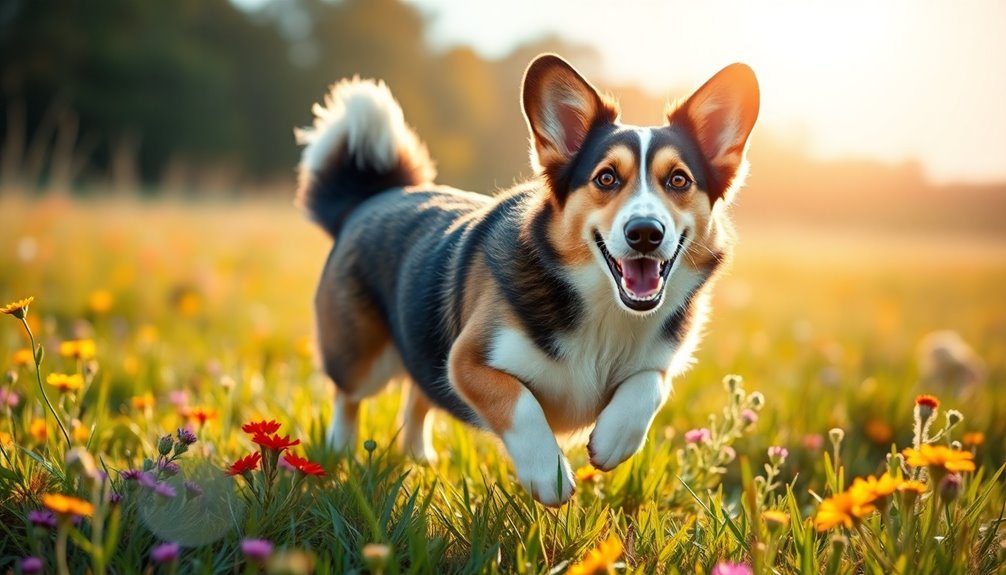
When you think of Cardigan Welsh Corgis, you can't help but notice their noble lineage, which is often linked to royalty. Queen Elizabeth II famously adored these charming dogs, making them a symbol of elegance and companionship. Their long, expressive tails not only add to their charm but also reflect their rich history as loyal companions to the elite. The tail carriage of a Cardigan Welsh Corgi contributes significantly to their overall balance and presentation, much like their Pembroke counterparts.
Noble Lineage Linked to Royalty
Cardigan Welsh Corgis have long been celebrated for their noble lineage, which is often linked to royalty. Introduced to Wales by Celtic tribes around 1200 BC, these dogs trace their roots back to northern spitz-type dogs and the Teckel family. Known as one of the oldest breeds in the British Isles, they were originally called "yard-long dog" in Welsh, showcasing their unique stature.
Historically, their significance was immense, with ancient Welsh law protecting them due to their economic value. There were severe penalties for anyone harming or stealing a Cardigan Welsh Corgi. Their skills in herding, guarding, and vermin hunting made them invaluable, particularly in managing cattle on common land in Wales. Remarkably, these dogs have been known in Wales for more than 3,000 years, which highlights their long-standing presence in the region.
As the breed developed, they were bred for herding and driving cattle, effectively using their low stature to avoid kicks. Crossbreeding with local sheepdogs enhanced their versatility, leading to the establishment of a breed standard recognized by The Kennel Club in 1928.
Today, these charming dogs continue to be celebrated not just for their working skills, but also for their endearing companionship, embodying a lineage steeped in history and honor.
Queen Elizabeth Ii's Companion
How did a breed of dogs become such a beloved part of British royalty? For Queen Elizabeth II, Pembroke Welsh Corgis were more than just pets; they were cherished companions. Owning over 30 Corgis throughout her life, it all began with Susan, a gift for her 18th birthday that established the royal Corgi lineage.
The Queen took an active role in their care, ensuring they'd special diets and safety measures. She even collaborated with breeders to select mating partners, reflecting her commitment to maintaining their royal canine dynasty.
The Queen's affection for her Corgis extended into public life, where they often accompanied her during appearances, symbolizing her deep bond with the breed. Notably, Susan was part of royal history, joining Princess Elizabeth on her honeymoon.
After the Queen's passing, her last two Corgis, Muick and Sandy, found a new home with Prince Andrew and Sarah Ferguson, allowing her legacy to live on.
The Queen's love and dedication not only popularized Pembroke Welsh Corgis worldwide but also left a lasting impact on their breeding and care, ensuring these loyal companions remain a treasured part of royal history.
Active Lifestyle Compatibility
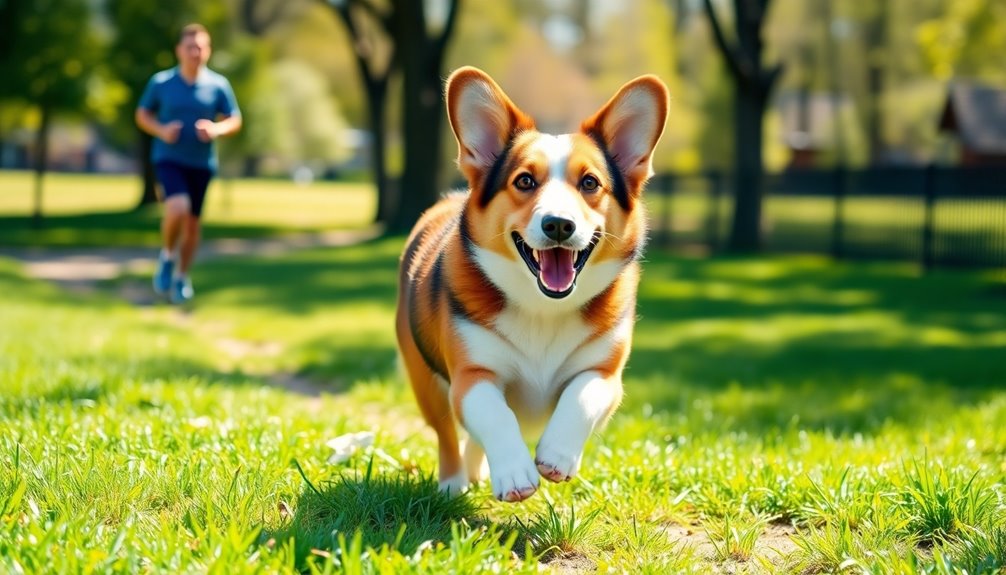
If you're looking for a family-friendly dog that can also enjoy some independence, the Cardigan Welsh Corgi is a great choice. Their adaptable nature means they fit well into various lifestyles, whether you're active or prefer a more relaxed routine. Plus, understanding their grooming needs and shedding frequency will help you keep your home and your pup happy. Additionally, they are known for their balanced energy level, making them suitable companions for both playtime and cozy evenings on the couch. To ensure a harmonious family environment, it's important to support a partner ready for parenthood as the dog becomes a part of your family dynamic.
Family-Friendly yet Independent
Many families find the Cardigan Welsh Corgi to be an ideal companion due to their friendly nature and adaptability.
These dogs get along wonderfully with children, making them perfect for family settings. Their social disposition allows them to bond well with other pets, including dogs, cats, and even farm animals, provided they're properly socialized. Additionally, engaging children in activities with the dog can enhance social skills, promoting a well-rounded family experience.
Cardigans are adaptable to various family dynamics, thriving in homes with singles, seniors, or children, as long as they receive ample attention and exercise. Their loyalty and protective instincts make them excellent watchdogs, though you'll need to supervise them around young kids to prevent nipping due to herding behavior.
While they're reserved with strangers, proper socialization from an early age helps them warm up to new people. Cardigans prefer company and don't like being left alone, so it's crucial to engage them in daily activities.
They require about 45 minutes of exercise each day, enjoying outdoor activities like fetch and hiking. Cardigans have a double coat that requires consistent grooming to minimize shedding, which can be part of their daily routine.
Their flexible energy levels let them transition from active play to cozy snuggles, making them a perfect fit for an active, family-oriented lifestyle.
Grooming Needs and Shedding Frequency
Maintaining the grooming needs of a Cardigan Welsh Corgi is crucial for keeping their coat healthy and minimizing shedding, especially if you lead an active lifestyle.
Regular brushing is essential, and you should aim to brush your Corgi at least three times a week, particularly during shedding cycles. Using an undercoat rake can help manage their thick coat, especially in summer and winter when shedding intensifies. It is important to prevent drain clogs by bathing outside to release the coat. Additionally, using a high-quality air purifier in your home can help reduce allergens and improve overall air quality for both you and your Corgi.
Avoid frequent bathing to preserve their natural oils; instead, use Simple Shed Shampoo and Simple Shed Treatment to loosen the undercoat when needed. Remember to keep baths on a non-slippery surface with moderate water temperature.
Additionally, you'll want to pay attention to their ears and eyes. Monthly ear cleaning with Espree Ear Care and using Opti-Soothe Eye Wash can help prevent issues. If you notice hot spots, applying Hot Spot Foam can provide relief.
With daily exercise and mental stimulation, your Corgi will thrive, making grooming an essential part of your routine.
Frequently Asked Questions
Are Cardigan Welsh Corgis Good With Children and Other Pets?
Yes, Cardigan Welsh Corgis are great with children and other pets.
They're social, playful, and enjoy family life, making them excellent companions for kids.
With proper training and early socialization, they can also get along well with cats and other dogs.
Just keep an eye on their herding instincts, as they might nip at children's heels.
How Much Exercise Do Cardigan Welsh Corgis Need Daily?
Cardigan Welsh Corgis need about 30 to 45 minutes of exercise daily.
You can break this into multiple short sessions, like 5 to 10 minutes each, to keep things engaging and fun.
Activities like walking, playing fetch, or swimming are great options.
What Is the Average Lifespan of a Cardigan Welsh Corgi?
The average lifespan of a Cardigan Welsh Corgi is typically between 12 to 15 years, with some living up to 13.1 years based on recent studies.
Genetics, diet, and overall care play significant roles in their longevity.
To help your Corgi live a longer, healthier life, ensure they receive regular exercise, proper nutrition, and preventive veterinary check-ups.
Being proactive about their health can make a big difference in their lifespan.
Do Cardigan Welsh Corgis Shed a Lot?
Yes, Cardigan Welsh Corgis do shed a lot.
They've a thick double coat that sheds year-round, with more noticeable shedding during spring and fall as they adjust to temperature changes.
Regular grooming is key to managing this shedding. You'll want to brush them frequently to minimize loose fur around your home.
Keep an eye on their diet and stress levels, as these factors can also influence how much they shed.
Can Cardigan Welsh Corgis Live in Apartments?
Yes, Cardigan Welsh Corgis can live in apartments! Their small size and adaptable nature make them great companions in smaller spaces.
You'll need to ensure they get at least 30 to 45 minutes of exercise daily and manage their vocal tendencies with proper training.
With consistent mental stimulation and regular grooming, they can thrive in an apartment setting.
Just remember, they'll need room to move and play to stay happy and healthy!
Conclusion
In conclusion, the Cardigan Welsh Corgi makes a fantastic companion for those who appreciate loyalty and affection. With their rich history and charming personalities, they fit seamlessly into various lifestyles. If you're ready for an active, loving partner, this breed will bring joy and warmth to your home. So, whether you're going for long walks or enjoying quiet evenings, a Cardigan Welsh Corgi will be right by your side, wagging its tail with happiness.

